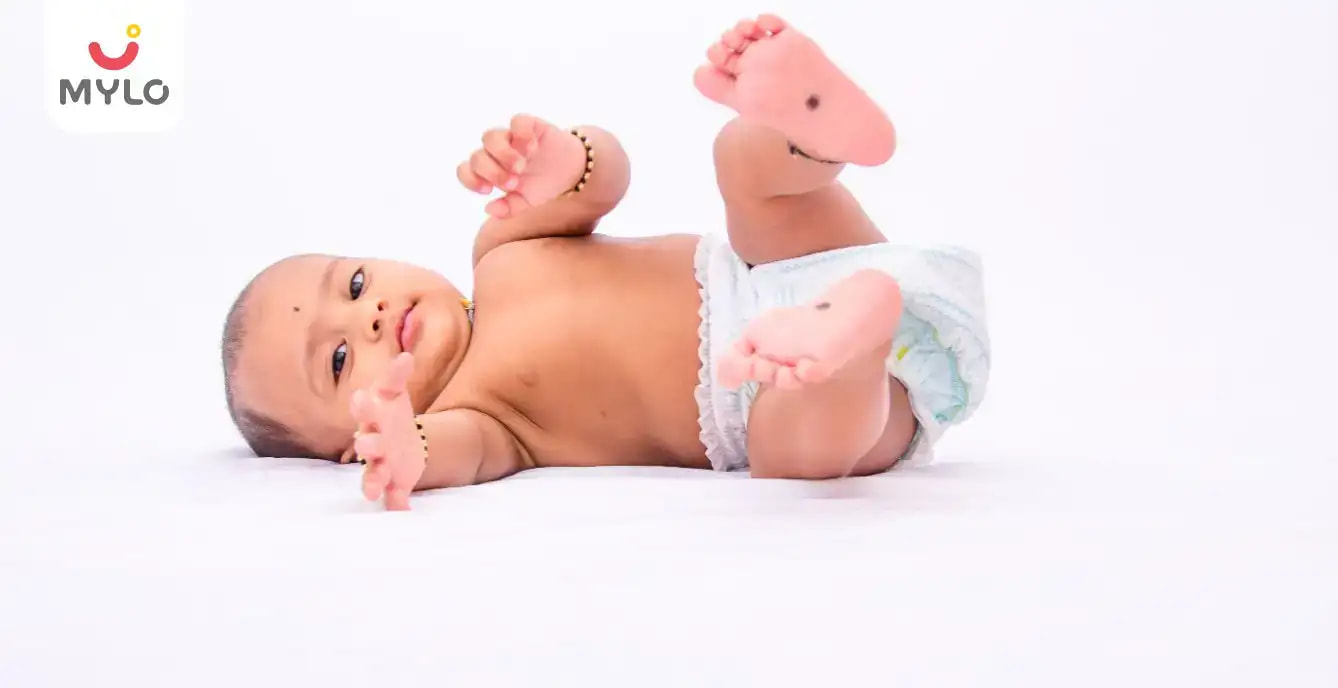Home

Growth & Development

Baby Weight Chart: An Indian Parent's Guide to Growth Patterns
In this Article

Growth & Development
Baby Weight Chart: An Indian Parent's Guide to Growth Patterns
Updated on 3 November 2023
Like many parents, it is normal to be anxious and confused about the baby's ideal weight. As first-timers, parents often wonder if the baby's weight is within normal range. As the baby grows, weight is one of the most significant indicators of the overall health and development of the baby. The newborn baby's weight is an indicator of the baby's health. However, over one year, gradual development and changes in body weight occur. In this article, we will take a look at baby weight chart and baby height and weight chart and understand how much weight should a baby gain in the first year.
What is the Ideal Body Weight for an Infant?
The normal baby weight in kg established by World Health Organization for a newborn is around 3.2 to 3.4 kg (7 and 7 ½ pounds). However, low birth weight for a baby is found to be due to various reasons, including:
-
Premature birth of the babies leads to smaller baby size, whereas babies born past their due date may be larger.
-
Gestational diabetes is another reason leading to a smaller baby size.
-
Poor nutritional status of the mother during pregnancy might lead to a smaller baby size. However, excessive weight gain might lead to a large baby size.
-
Gender also sometimes indicates the size of the baby. The baby girl's weight chart shows that a baby girl is lighter than a baby boy.
-
Smoking during pregnancy causes adverse effects, of which one is underweight babies.
Baby Weight Chart by Month in kg
This baby weight chart in kg represents the baby's ideal weight from birth to one year. This Indian baby weight chart indicates gender-based standard weight.
|
Age |
Boys (50th percentile) |
Girls (50th percentile) |
|
Birth |
7.8 lbs (3.5 kg) |
7.5 lbs (3.4 kg) |
|
1 month |
9 lbs 14 oz (4.5 kg) |
9 lbs 4 oz (4.2 kg) |
|
2 months |
12 lbs 5 oz (5.6 kg) |
11 lbs 4 oz (5.1 kg) |
|
3 months |
14 lbs (6.4 kg) |
12 lbs 14 oz (5.8 kg) |
|
4 months |
15 lbs 7 oz (7.0 kg) |
14 lbs 2 oz (6.4 kg) |
|
5 months |
16 lbs 9 oz (7.5 kg) |
15 lbs 3 oz (6.9 kg) |
|
6 months |
17 lbs 8 oz (7.9 kg) |
16 lbs 2 oz (7.3 kg) |
|
7 months |
18 lbs 5 oz (8.3 kg) |
16 lbs 14 oz (7.6 kg) |
|
8 months |
19 lbs (8.6 kg) |
17 lbs 7 oz (7.9 kg) |
|
9 months |
19 lbs 10 oz (8.9 kg) |
18 lbs 2 oz (8.2 kg) |
|
10 months |
20 lbs 3 oz (9.2 kg) |
18 lbs 11 oz (8.5 kg) |
|
11 months |
20 lbs 12 oz (9.4 kg) |
19 lbs 4 oz (8.7 kg) |
|
12 months |
21 lbs 3 oz (9.6 kg) |
19 lbs 10 oz (8.9 kg) |
Note: 50th percentile means 50% of babies of the same age weigh more, and 50% of babies weigh less. It is an average weight.
Weight Gain of the Baby in the First Year
The newborn baby's weight will differ from a 2-month baby's weight due to gradual growth and development. Generally, this is what you can expect in the first 12 months in terms of a baby’s growth:
1. By one month
The normal weight of new born baby in India can vary, but generally, a healthy newborn weighs between 2.5 to 3.5 kilograms (5.5 to 7.7 pounds). After one month of their birth, the babies start gaining weight as they develop a regular feeding pattern.
2. Six months
There is a stark difference in the 2 month baby weight, 3 month baby weight, 5 month baby weight, and 6 month baby weight. This is also the period of growth spurt indicated by a big surge of growth within a short period. It happens anytime within the first month to 6 months of birth. The baby needs more milk during this time, which is also known as cluster feeding.
3. One year
Between six months and one year, the weight gain slows down. The 7-month baby's weight is almost double the baby's birth weight. The process of cluster feeding slows down, which makes the 8-month baby weight and 9-month baby weight almost similar. The weight increases just 0.5 kg to 1 kg at maximum during this period.
Height Chart for Newborn to 1-Year-Old Babies
We have already seen the baby weight chart by month in kg, now, let us take a look at the height chart for Indian babies in the first year and understand what their ideal height should be:
| Age (In months) | Boy (Height in cm) | Girl (Height in cm) |
| 0 | 46.3-53.4 | 45.6 - 52.7 |
| 1 | 51.1 - 58.4 | 50.0 - 57.4 |
| 2 | 54.7 - 62.2 | 53.2 - 60.9 |
| 3 | 57.6 - 65.3 | 55.8 - 63.8 |
| 4 | 60.0 - 67.8 | 58.0 - 66.2 |
| 5 | 61.9 - 69.9 | 59.9 - 68.2 |
| 6 | 63.6 - 71.6 | 61.5 - 70.0 |
| 7 | 65.1 - 73.2 | 62.9 - 71.6 |
| 8 | 66.5 - 74.7 | 64.3 - 73.2 |
| 9 | 67.7 - 76.2 | 65.6 - 74.7 |
| 10 | 69.0 - 77.6 | 66.8 - 76.1 |
| 11 | 70.2 - 78.9 | 68.0 - 77.5 |
| 12 | 71.3 - 80.2 | 69.2 - 78.9 |
What to Do If You Are Concerned About Your Baby’s Weight?
Contact your paediatrician if your baby does not fall close to the ideal range in baby height and weight chart. The paediatrician will examine and check the baby’s growth rate and provide a personalized nutritional therapy. If the baby is not gaining weight with the supply of mother’s milk, doctors often recommend baby weight gain food. The doctors also recommend supplement or formulation along with the mother’s milk. If your baby has suckling trouble, it is best to contact a lactation consultant to get the best suggestions. Doctors recommend adding solid formulation after 6 months ideally.
FAQs
1. Why is there a difference between baby girl weight chart and baby boy weight chart?
Girls and boys have different growth charts because they grow in different patterns and at different rates. It's important to remember that being in a higher or lower percentile on the chart doesn't necessarily indicate a problem, as long as the child is growing at a healthy rate.
2. According to an Indian baby weight chart, how much should a 3-month-old baby weigh?
According to an Indian baby weight chart in kg, a 3-month-old baby boy should weigh around 6.4 kg and a baby girl should weigh around 5.8 kg. It's important to note that these weights are just average guidelines, and individual baby weights can vary based on various factors such as genetics, nutrition, and overall health.
Conclusion
The baby's weight is an important indicator of many things, including the growth and development of the baby. By keeping an eye on the baby weight chart and tracking your baby's weight accordingly, you can keep a record of their growth and take steps to improve it. It is often a matter of worry if your baby is underweight or overweight; hence, consulting the doctor is highly recommended in such cases.
References
1. Wright CM. (2005). Growth charts for babies. BMJ
2. Dr Parekh, B, Dr Khadilkar, V. Paediatrician friendly IAP Growth Charts for 0-18 years. Indian Academy of Pediatrics
Tags
Baby Weight Chart in Bengali, Baby Weight Chart in Tamil, Baby Weight Chart in Telugu
Trending Articles
how to stop breastfeeding | baby cry | blw meaning | postpartum care
Popular Articles
what is postpartum hemorrhage | postpartum anxiety | how to deal with postpartum depression | postpartum belly wrap



Written by
Mittali Khurana
Mittali is a content writer by profession. She is a dynamic writer with 04+ years of experience in content writing for E-commerce, Parenting App & Websites, SEO.
Read MoreGet baby's diet chart, and growth tips

Related Articles
Related Topics
RECENTLY PUBLISHED ARTICLES
our most recent articles

Diet & Nutrition
গর্ভাবস্থায় আলুবোখরা: উপকারিতা ও ঝুঁকি | Prunes During Pregnancy: Benefits & Risks in Bengali

Diet & Nutrition
গর্ভাবস্থায় হিং | ঝুঁকি, সুবিধা এবং অন্যান্য চিকিৎসা | Hing During Pregnancy | Risks, Benefits & Other Treatments in Bengali

Women Specific Issues
স্তনের উপর সাদা দাগ: লক্ষণ, কারণ এবং চিকিৎসা | White Spots on Nipple: Causes, Symptoms, and Treatments in Bengali

Diet & Nutrition
গর্ভাবস্থায় পোহা: উপকারিতা, ধরণ এবং রেসিপি | Poha During Pregnancy: Benefits, Types & Recipes in Bengali

Diet & Nutrition
গর্ভাবস্থায় মাছ: উপকারিতা এবং ঝুঁকি | Fish In Pregnancy: Benefits and Risks in Bengali

Diet & Nutrition
গর্ভাবস্থায় রেড ওয়াইন: পার্শ্ব প্রতিক্রিয়া এবং নির্দেশিকা | Red Wine During Pregnancy: Side Effects & Guidelines in Bengali
- ইনার থাই চ্যাফিং: কারণ, উপসর্গ এবং চিকিৎসা | Inner Thigh Chafing: Causes, Symptoms & Treatment in Bengali
- গর্ভাবস্থায় ব্রাউন রাইস: উপকারিতা ও সতর্কতা | Brown Rice During Pregnancy: Benefits & Precautions in Bengali
- Velamentous Cord Insertion - Precautions, Results & Safety
- Unlock the Secret to Flawless Skin: 7 Must-Have Qualities in a Face Serum
- Unlock the Secret to Radiant Skin: How Vitamin C Serum Can Transform Your Complexion
- Gender No Bar: 10 Reasons Why Everyone Needs a Body Lotion
- Unlock the Secret to Radiant Skin How to Choose the Perfect Body Lotion for Your Skin Type
- Top 10 Reasons to Apply a Body Lotion After Every Bath
- Communication in Toddlers: Milestones & Activities
- How to Improve Vocabulary for Toddlers?
- A Comprehensive Guide to Understanding Placenta Accreta
- Vulvovaginitis in Toddlers Causes, Symptoms and Treatment
- A Comprehensive Guide to Understanding Cerebral Palsy in Children
- Bitter Taste in Mouth During Pregnancy: Understanding the Causes and Remedies


AWARDS AND RECOGNITION

Mylo wins Forbes D2C Disruptor award

Mylo wins The Economic Times Promising Brands 2022
AS SEEN IN

- Mylo Care: Effective and science-backed personal care and wellness solutions for a joyful you.
- Mylo Baby: Science-backed, gentle and effective personal care & hygiene range for your little one.
- Mylo Community: Trusted and empathetic community of 10mn+ parents and experts.
Product Categories
baby carrier | baby soap | baby wipes | stretch marks cream | baby cream | baby shampoo | baby massage oil | baby hair oil | stretch marks oil | baby body wash | baby powder | baby lotion | diaper rash cream | newborn diapers | teether | baby kajal | baby diapers | cloth diapers |








